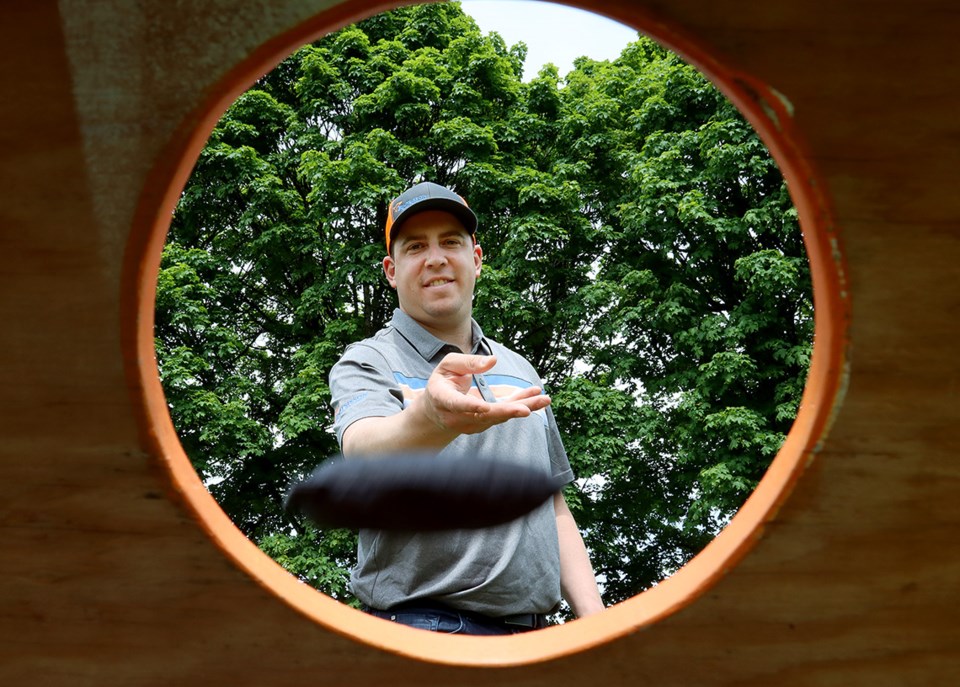Shane Goutsis is dead serious when he says cornhole could be sport’s next big thing.
On Aug. 27th in Port Coquitlam, it will be.
That’s when 64 teams of two players each will gather at Cedar Drive Park for a day-long cornhole tournament, the backyard pastime where competitors try to toss a beanbag through a hole in a board.
The event, The 5C Colon Cancer Charity Cornhole Classic, is a fundraiser for research into colon cancer.
This will be the second Cornhole Classic. The first, in 2019, raised $11,000. Then the COVID-19 pandemic hit and public health orders limited the ability of people to gather so they could pitch beanbags through a hole, amongst other activities.
Goutsis said the Cornhole Classic was born from love for Ric Sisson, a longtime proprietor of Coquitlam Towing and Storage who also happens to be his wife’s uncle.
Sisson was diagnosed with colon cancer in 2019 and succumbed to the disease in 2020.
The success of the first cornhole tournament led to the formation of the Goutsisson Family Foundation that’s raised more than $40,000 for colon cancer research through various projects like the Tour of the Tri-Cities, a passport booklet that rewards participants for visiting local businesses.
Goutsis said the nature of colon cancer means the disease doesn’t have the kind of profile that attracts big fundraising ventures or even awareness campaigns. But according to the Canadian Cancer Society, colorectal cancer will account for 10 per cent of all new cancer cases and it’s responsible for 11 per cent of deaths from cancer. It affects man and women almost equally.
“It’s a shitty cancer,” Goutsis said, adding the association of the disease to cornhole seems a natural fit, with all kinds of potential for fun with puns.
The universal accessibility of cornhole also helps lower barriers to talking about colon cancer.
“Anybody can play cornhole,” Goutsis said. “You just have to be able to throw.”
But playing it, and playing it well are two different things.
Goutsis said successful cornhole players practice a lot. Some prefer to bunch the beanbag in their hands, while others flatten the bag so it lofts a little more.
Standing 27 feet from the board, some players toss the bag underhand, sometimes with a backspin. Others opt to fling it like a flying disc.
“You have to know the distance and the range,” Goutsis said.
Competitors score three points for getting the bag through the hole, and one point if the bag lands on the surrounding board. The first team of two players to reach 21 points wins a game.
According the American Cornhole Organization, the sport’s worldwide governing body since 2005, cornhole originated in Germany in the 14th century, then was rediscovered in the hills of Kentucky more than 100 years ago.
Pro tournaments the ACO runs offer purses up to $25,000 and are streamed live on its website as well as Facebook and then replayed on YouTube. The 17th world championships of cornhole will be contested in Branson, Mo., in July.
Goutsis said the PoCo event is more about fun. Entrants will be encouraged to come up with fun nicknames and wear costumes. There will be live entertainment as well as a DJ, four local breweries and three food trucks to help keep competitors hydrated and fed, and additional games like axe throwing, Jenga and ladder golf to keep them amused between matches.
But an initiative to get two sets of aluminum cornhole boards placed permanently in Aggie Park could raise the level of competition in the future.
“It’s like the new age horseshoes,” Goutsis said.
• For more information about the Cornhole Classic, check out the event’s website at tgff.ca.




